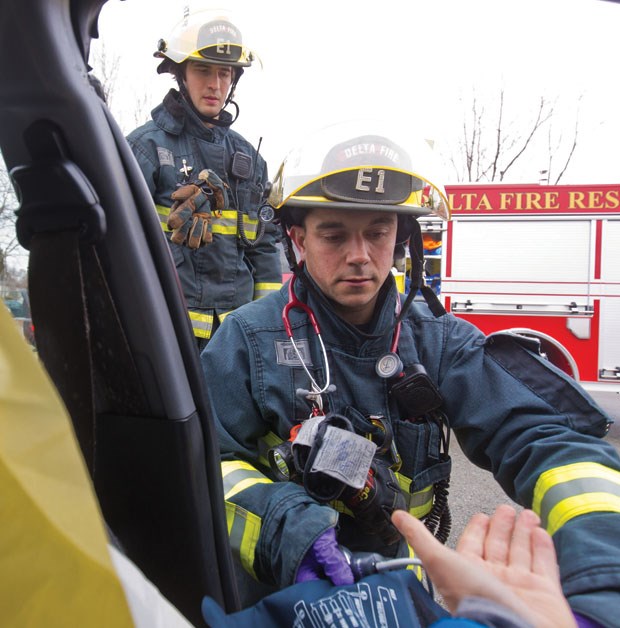It was years in the making and endured a controversial launch, but Delta's fire chief says the enhanced medical assistance provided by firefighters is now experiencing nothing but positives.
Firefighters have been providing advanced care to accident and fire victims since June 2015, administering pain relief medication, taking blood pressure, using pulse oximeters, administering IVs and providing airway management.
Fire Chief Dan Copeland said when the process to change Since acquiring the enhanced training, firefighters are dispatched simultaneously during a 911 call involving a medical emergency.
"So this means that when we arrive on scene we have the ability now to assess the patient and we can provide some form of pain management while waiting for the paramedics to arrive," Copeland said.
"We also are in constant communication with the paramedics, so we can relay all the information back to them and if a patient is willing to self-release, meaning they want to get to the hospital or walk-in clinic on their own and don't want to have paramedics transport, the patient can self-release from us, and the ambulance service can take that car off that call and reprioritize it to a more serious call."
Copeland said a recent call in Ladner speaks volumes of the value of sharing information.
"The call was for an elderly lady and while we were on route, the call was cancelled, but our guys just arrived outside the home and decided they would go in and check on the patient anyways," he said. "With the enhanced medical training we were able to assess the patient and determined that her oxygen levels were quite low. They relayed that information and, in fact, the ambulance service re-deployed the car.
"In the past without that training, we either don't go inside because we have been told the call was cancelled, or we do go inside and then can't do what we did because we didn't have the training. Who knows what might have happened."
In January, the fire department utilized its enhanced medical training on 79 per cent of the medical or motor vehicle accident calls it attended.
Mayor Lois Jackson said she is proud of the fire department and proud that civic officials fought for this for so many years. "It's the people's services, it's the people's tax dollars, so if firefighters can get there first and provide comfort, that is what's important to me," said Jackson. "When the paramedics get there all the vitals are done and the paramedics can then know exactly where that patient is and they have a baseline from which to work. Working together like this has been good for the people of Delta and that's my main concern. "As long as this is working for this community, I will stand by it."
Dr. William Dick, vice president of medical programs for BC Emergency Health Services, said there has been good cooperation.
"Every month they send us the call logs and I've reviewed the patient care that has been occurring and I have had no concerns," said Dick. "We are building a good trustworthy relationship and when there has been an issue, there has been no problem calling them and asking them just to change this or that.
"The BC Ambulance (Service) crews are working well with them on the street. Things are much better than they were in the sense of cooperation and I think their desire to give that enhanced patient experience. There have been no downsides to it."
Copeland said firefighters can get to most accident scenes within three to eight minutes, while paramedics are 10 minutes or greater behind.
"We cover a large geographic area and cars (ambulances) are dispatched to service throughout the Metro Vancouver area," said Copeland. "We've had cars from White Rock, Burnaby, Abbotsford, Richmond and Vancouver. Yes, the cars are available at the beginning of our shift in Tsawwassen, Ladner or North Delta, but throughout the shift, those cars could be anywhere.
"And this has nothing to do with the front-line paramedics. They are outstanding and they work very well with our firefighters. The focus is always on the patient and has never been about us replacing the work of the paramedics."



